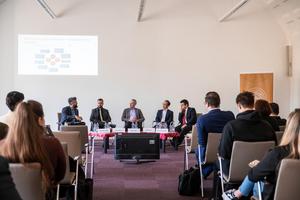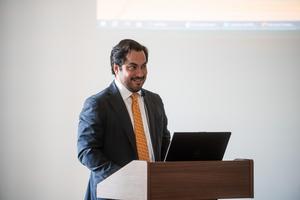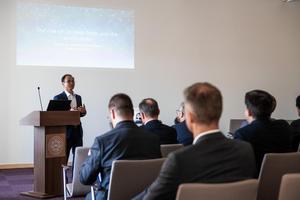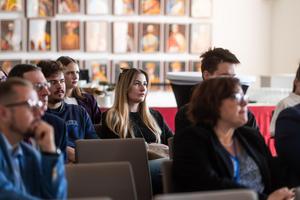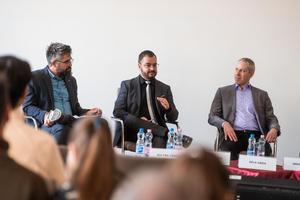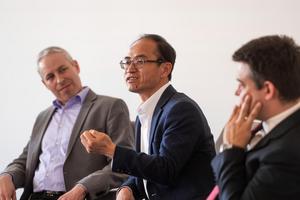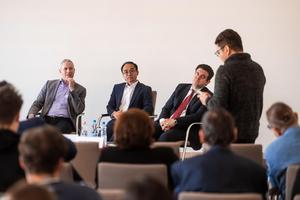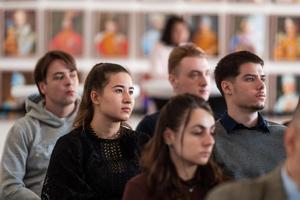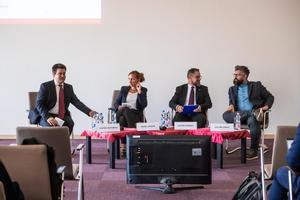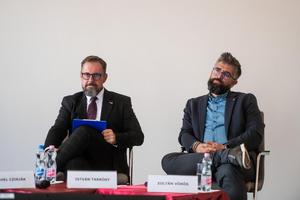The John Lukacs Institute for Strategic and Politics (part of the Eötvös József Research Centre at the Ludovika University of Public Service) held a conference on the impact of emerging Asian powers on the global order on 30 October, in the Zrínyi Hall of the main Ludovika building.
In his opening remarks, Pier Paolo Pigozzi, Vice-Rector for International Affairs at Ludovika University, highlighted the timeliness of the conference theme – the transformation of the global order and the rise of Asian powers. He emphasized that Ludovika University is not only a center for public administration education, but also for research on national and international issues. “We consider it essential that our students gain both theoretical and practical knowledge, equipping themselves for the challenges of today’s world,” he noted. The Vice-Rector also pointed out that Ludovika continues to strengthen its international partnerships through scholarships and mobility programmes, creating opportunities for people from around the world to engage in joint reflection on global challenges. He stressed that the University’s research institutes – including the China and Indo-Pacific Research Programme of the John Lukacs Institute – play an important role in understanding ongoing geopolitical shifts.
In his keynote speech in a panel entitled “Norms and Institutions in the Rewriting of World Order,” Professor Showei He (University of Northampton) presented his research on the rise and innovative capacity of Chinese enterprises. He reminded the audience that over the past two decades, Chinese companies have significantly increased their share among the world’s largest corporations, while traditional Western economies (such as the UK, Germany, Japan, and France) have seen their relative weight decline. Chinese firms are investing heavily in research, development, and innovation – gradually transforming the earlier perception of China as a source of “cheap, low-quality products.” China is now a major force in sectors such as energy efficiency, renewable energy, rail transport, and electronics, though it still lags behind in biotechnology and microchip manufacturing – areas that are also advancing rapidly. Professor He emphasized that the reshaping of the global order can be observed not only in political and economic institutions (like the IMF or the World Bank), but also in the creation of industrial and technological standards, where Chinese companies are becoming increasingly influential (for example in 5G, 6G, AI, robotics, and battery technology). He also presented his own research on Chinese investment in British technology firms, showing that knowledge transfer is two-way: while Chinese companies learn from Western technologies, British subsidiaries also benefit from the experience of their Chinese parent firms — especially in railway and renewable energy development.
Following the lecture, a roundtable discussion explored how three Asian powers — Indonesia, India, and China — relate to the transformation of international norms and what roles they seek in the 21st-century global system. Participants included Professor Showei He, Máté Szakáli (researcher, Eurasia Center, Neumann János University), Béla Háda (research fellow, JLI), and Viktor Eszterhai (research fellow and head of the China and Indo-Pacific Programme, JLI). The session was moderated by Zoltán Vörös, senior researcher of the same programme.
Máté Szakáli stressed that Indonesia is neither a challenger nor a copy of the existing world order, but pursues a pragmatic, bridge-building foreign policy based on dialogue and cooperation. Jakarta avoids military alliances but actively shapes norms through multilateral forums such as ASEAN, seeking stability through institution-building rather than confrontation. Indonesia thus aims not to replace the existing order but to make it more flexible and inclusive, acting as a bridge between the Global North and South. Béla Háda noted that India’s foreign policy continues to be guided by independence and non-alignment. Its goal is to balance China’s growing power while maintaining constructive ties with the West (the U.S. and the EU). Economically and technologically, India strives for self-reliance but still lags behind China in areas such as information technology, defense, and AI development. According to Háda, India positions itself as a potential “third pole” in global power competition, drawing on its civilizational heritage and representing the interests of the Global South. Viktor Eszterhai argued that China’s role is that of a norm-creator and institution-builder for the Global South. Since the 2008 financial crisis and the relative weakening of U.S. dominance, China has sought to shape its environment more actively, primarily through economic means – for instance, the Belt and Road Initiative. During the first Trump administration, U.S. policy disruptions encouraged Beijing to promote alternative global frameworks. China’s aim is not to replace global rules but to provide alternative platforms for cooperation among developing nations. By enhancing its economic, technological, and institutional capacities, China seeks to expand its influence – especially across the Global South, where receptivity to new norms is growing.
The next keynote lecture, titled in a panel “Testing the New Order: Global South Perspectives on Norms and Institutions”, was delivered by Professor István Tarrósy, head of African Studies at the University of Pécs. He began by noting that the Global South is not homogeneous but rather a diverse collection of regions, countries, and societies – ranging from more developed states like Brazil to poorer nations such as Chad or the Maldives. He emphasized that the term “Global South” now represents not only a geographical category but also a political and economic identity: many southern countries are seeking to create their own norms, institutions, and development models rather than simply adopting Western ones. Focusing on Africa, Tarrósy described the continent as both an opportunity and a challenge. Weak governance and corruption often hinder unified action and autonomous norm-building, yet African states are gaining room for maneuver by playing major powers – the U.S., China, Russia, India, or Turkey – against one another. This enhances their bargaining power in the international system. He highlighted the African Union’s “Agenda 2063”, which envisions an independent African future built on development, integration, and a shared identity.
In the closing roundtable, participants discussed the evolving roles of China and the Global South in reshaping international development. The panel included István Tarrósy, Ráhel Czirják (Head of International Development, Hungarian Maltese Charity Service), and Zoltán Vörös and Viktor Eszterhai (John Lukacs Institute for Strategic and Politics), who served as moderators.
Ráhel Czirják presented the international activities of the Maltese Charity Service, which operates in more than ten countries, mainly in Africa and the Middle East, focusing on education, healthcare, and urban development. She noted that China has introduced a new narrative into the field of global development – one that emphasizes equal partnership among developing countries — and this has partially reshaped the rhetoric of European donors as well. Zoltán Vörös analyzed China’s dual identity in international relations: on the one hand, it remains a developing country dependent on global trade and financial systems (e.g. WTO, World Bank); on the other, it is already a technologically advanced power creating alternative institutions such as BRICS and the Asian Infrastructure Investment Bank. He described this duality as part of Beijing’s strategy of “preparing for a multipolar world.”
The participants agreed that while the countries of the Global South do not yet share a single strategic identity, their common interests – economic autonomy, technological development, and equitable representation – are increasingly aligning. Within this network, China plays a central mediating and shaping role. The emerging world order, they concluded, is moving toward a multipolar, flexible, and partnership-based system, in which new powers – especially China – are not merely participants but active architects.
Text: Éva Harangozó
Photos: Dénes Szilágyi
